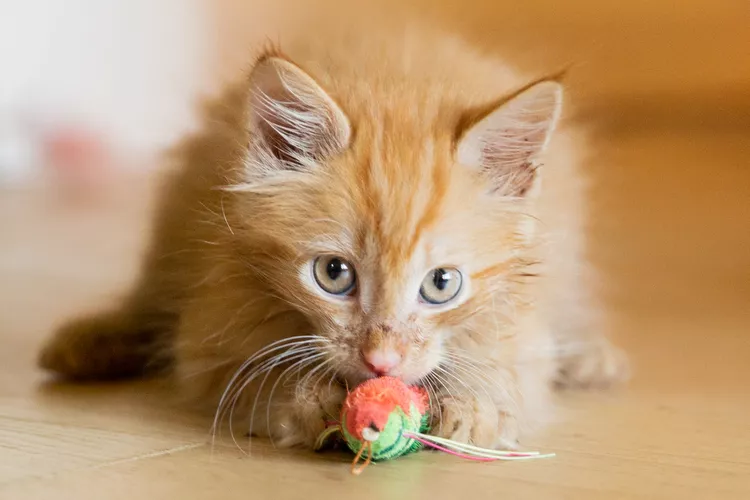How to Keep Your Kitten Safe While Playing

Kittens are the epitome of playfulness, but they seem to get their tiny paws on everything imaginable. While letting your kitten play and explore is important to its mental development, you need to make sure that what it's playing with is safe.
Importance of Play Behavior
Young animals, including kittens, learn a lot about life through play behaviors. From a very young age, kittens learn to stalk prey, pounce, attack, grab, climb, chew, and practice other behaviors that are vital to survival, especially if they aren't indoor cats and have to catch their own food. By wrestling with their littermates, kittens learn how hard they need to grab, where to bite, and how to pounce on prey. They also learn what their limitations are from their mother and the other kittens in their litter, which helps them develop self-control. When they play bite other cats, they find out what hurts and what doesn't. Stalking behaviors teach them how to catch prey, so they practice watching and tracking their littermates before pouncing on them. If a kitten is not given the opportunity to play with their mother, other kittens, and various toys, these behaviors and socialization skills will not develop as they should.
Kittens who did not get a chance to explore normal play behaviors with other kittens and their mother may play too rough with people. They may be aggressive and bite, grab, and scratch when they are simply trying to play or may not be good at stalking and catching prey. Later in life, this lack of appropriate play behavior at a young age can lead to issues getting along with other cats and even people.
Playing has also been shown to be an important part of the brain and overall neurological systems in cats. A review from the American Journal of Play even remarked that some parts of the brain that play behaviors affect, called the neocortical executive control regions, also affect other parts of the nervous system. This means that proper play behaviors influence things like decision-making skills and memory in the brain.
Dangers
Kittens love to explore and will pounce at the opportunity to put odd items in their mouths if the item is small enough. Household items such as twist ties, strings, yarn, hair ties, buttons, coins, staples, coins, bottle caps, rubber bands, and more are popular playthings for curious kittens. These items may get within your kitten's reach if they fall off a counter or table. Oftentimes owners are completely unaware that they are missing an object until they see their kitten playing with it. If the kitten decides to start chewing on the object or put it in its mouth, the object becomes an immediate cause for concern and should be taken away.
If a kitten swallows an item, it may need to be removed by your veterinarian. Occasionally the objects can be removed using endoscopy or by causing the kitten to vomit, but surgery is most often what is done to remove items that can cause problems. Unproductive vomiting is usually the first indication that your kitten has eaten something it shouldn't have, but sometimes it will be days before you notice any symptoms. Other symptoms include a decrease or lack of appetite, a sensitive or painful belly, a decrease in activity, and even a decrease or lack of bowel movements. Because of the risk of a kitten eating something that could cause an issue, be sure to pick up any small items that you find lying within reach of your young cat.
Safe Homemade Toys
If your kitten likes to play with household items, you may consider making some safe toys. Common items that you're likely to dispose of or recycle can often be used as toys for kittens. Cardboard toilet paper rolls, empty tissue boxes, and packing tape rolls are all too large for a kitten to eat but can be played in and batted around.
Smaller items that are still too large to fit in your kitten's mouth, such as plastic bottle caps, ping-pong balls, drink coasters, and even small, empty, plastic pill bottles, are fun for a kitten to play with. You can also wad up a paper towel, tissue, or piece of aluminum foil for your cat to roll around, but be sure to monitor your kitten in case it tries to tear off pieces small enough to consume.